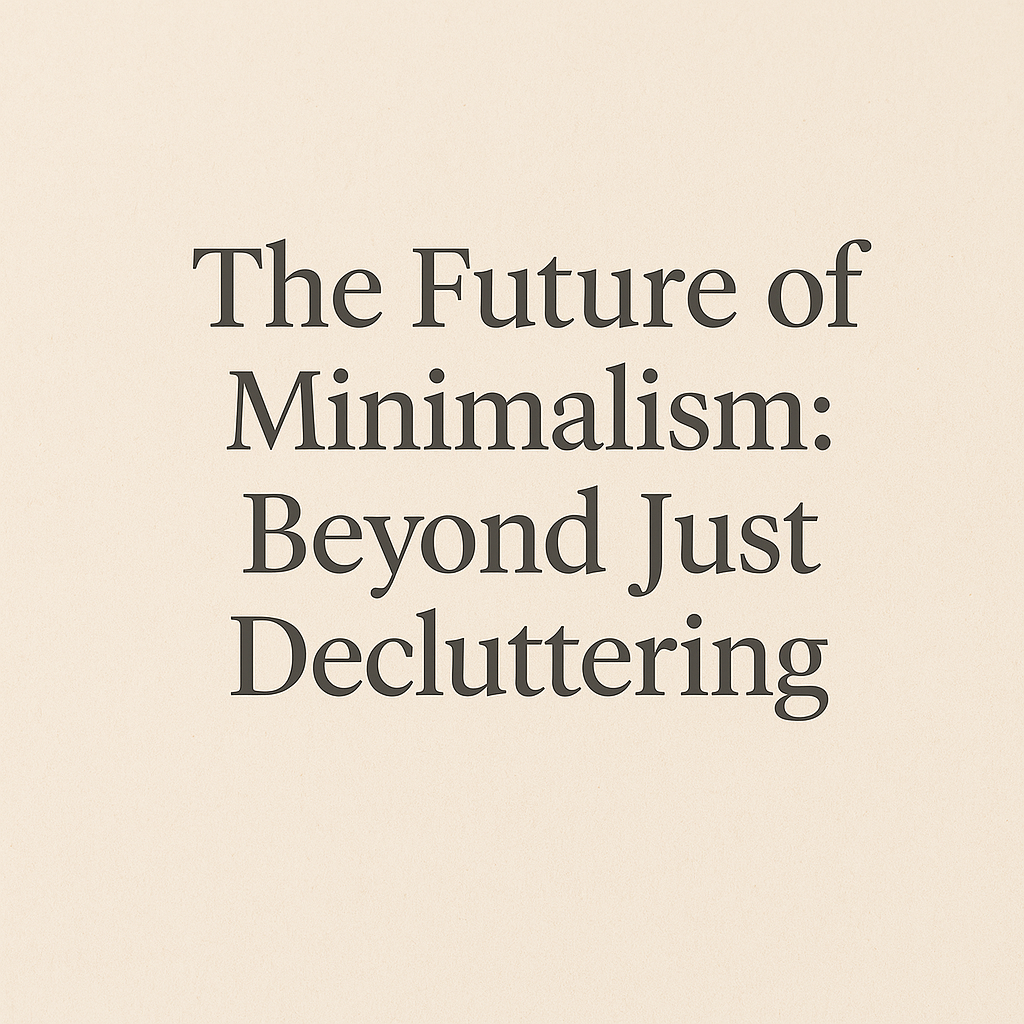Introduction
The Future of Minimalism: Beyond Just Decluttering. Minimalism has long been associated with decluttering—getting rid of excess stuff and simplifying one’s surroundings. However, as we move into 2025, minimalism is evolving beyond just tidying up our physical spaces. The future of minimalism is about intentional living, digital mindfulness, environmental consciousness, and a deeper connection to personal values.
In this blog, we’ll explore the new face of minimalism, why it’s becoming more than just a design aesthetic, and how embracing it can lead to a more fulfilling life.
Table of Contents
The Evolution of Minimalism
Minimalism, in its early days, was often viewed as an extreme lifestyle choice—owning as little as possible, living in stark white spaces, and rejecting consumer culture entirely. But in the modern world, minimalism is becoming more adaptable and inclusive. It is no longer just about how much you own but how you curate your life—from your digital presence to your mental space, relationships, and even work commitments.
Related Link: The Psychology of Minimalism: Why Less Is More
Why Minimalism Is More Relevant Than Ever
The world is becoming increasingly noisy, fast-paced, and overwhelming. We are constantly bombarded with information, advertisements, and distractions that make it difficult to focus on what truly matters. The new wave of minimalism is about reclaiming control—filtering out what doesn’t serve us and making room for meaningful experiences.
Some key reasons why minimalism is becoming more relevant in 2025:
- Digital Overload – The average person spends over 7 hours per day on screens, leading to burnout and mental fatigue.
- Climate Crisis – Conscious consumption is becoming essential for sustainability.
- Mental Health Awareness – A clutter-free life (physically and mentally) leads to reduced stress and increased clarity.
- Financial Freedom – Living with less allows people to save more and prioritize meaningful spending.
Related Link: How Digital Minimalism Can Improve Your Mental Health
Beyond Decluttering: The New Minimalist Movements
1. Digital Minimalism
One of the biggest shifts in modern minimalism is the focus on digital well-being. People are now decluttering not just their homes but also their social media, email inboxes, and online commitments. Digital minimalism promotes:
- Unplugging from unnecessary online distractions.
- Practicing mindful social media consumption.
- Reducing dependency on digital devices.
2. Sustainable Minimalism
Minimalism is aligning more with sustainability. It’s not just about owning fewer things but making eco-conscious choices—buying ethically, reducing waste, and choosing quality over quantity.
- People are shifting to capsule wardrobes to avoid fast fashion.
- Minimalist travel is on the rise, focusing on experiences rather than souvenirs.
- More individuals are embracing a low-waste lifestyle.
3. Emotional & Mental Minimalism
Minimalism is also transforming how we manage emotions, relationships, and mental clutter. This includes:
- Letting go of toxic relationships and setting boundaries.
- Reducing commitments that drain energy.
- Practicing mindfulness and meditation to maintain a clear mind.
4. Time Minimalism
We often think of minimalism in terms of possessions, but it applies to time management as well. The new minimalist movement emphasizes saying no to unnecessary obligations and focusing only on activities that bring joy and fulfillment.
- Adopting a simpler daily routine to avoid decision fatigue.
- Prioritizing deep work over multitasking.
- Making space for rest, hobbies, and creativity.
Related Link: The Art of Saying No: A Minimalist Approach to Time Management
How to Embrace the Future of Minimalism
If you’re looking to adopt a minimalist lifestyle that goes beyond decluttering, here are some practical steps to get started:
1. Perform a Life Audit
- Evaluate what areas of your life feel overwhelming.
- Identify where you can simplify—whether it’s possessions, digital habits, commitments, or relationships.
2. Adopt the “One In, One Out” Rule
- For every new item, commitment, or task you take on, remove one that no longer serves you.
3. Curate Your Digital Space
- Unsubscribe from unnecessary emails and unfollow accounts that don’t add value.
- Limit screen time and implement “phone-free” hours in your day.
4. Shift Your Mindset from Ownership to Experience
- Invest in experiences rather than material goods.
- Focus on hobbies and skills rather than accumulating possessions.
5. Create a Sustainable Consumption Plan
- Buy only what you truly need.
- Support ethical brands and local businesses.
- Embrace repair culture instead of replacing items immediately.
6. Practice Gratitude and Presence
- Minimalism is ultimately about appreciating what you already have.
- Incorporate daily gratitude reflections to cultivate contentment.
The Future of Minimalism: A Lifestyle, Not a Trend
Minimalism is no longer just about having less—it’s about living intentionally. As we enter 2025, the movement is shifting from being a trend to a long-term philosophy, helping people design lives that are aligned with their values and well-being.
Minimalism is not about deprivation—it’s about freedom. The freedom to focus on what truly matters, to be mindful of our choices, and to lead a life of purpose.
Are You Ready to Embrace Minimalism?
Minimalism is unique to each person. Whether you choose to start by decluttering your home, managing your digital space, or simplifying your schedule, the key is to do it with intention. The future of minimalism isn’t about how little you own, but about how much peace and fulfillment you gain.
What aspect of minimalism resonates with you the most? Let’s start the conversation below!
Find more Lifestyle & Personal Development content at: https://allinsightlab.com/category/lifestyle-personal-development/

